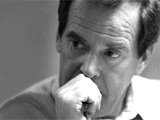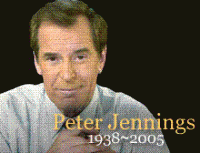Broadcaster Peter Jennings dies at 67
CTV.ca News Staff
Canadian-born Peter Jennings, a pillar of American TV journalism for decades, died of lung cancer Sunday at age 67.
"Peter died with his family around him, without pain and in peace. He knew he'd lived a good life," his family said in a statement.
As anchor of ABC News World News Tonight, Jennings presented the news to millions of viewers each night.
"Peter has been our colleague, our friend, and our leader in so many ways. None of us will be the same without him,'' said ABC News President David Westin.
Along with Tom Brokaw of NBC and Dan Rather of CBS, Jennings occupied one of the "Big Three" pinnacles in American TV journalism, presenting the news to millions of viewers.
Tributes were pouring in Monday for Jennings.
"Peter always was a natural to television," CTV's Chief News Anchor and Senior News Editor Lloyd Robertson told Canada AM. "In my personal view, he was the best of the breed. I don't think there was anybody as good as Peter Jennings."
"He was an incredible journalist," Canada's Consul General Pamela Wallin told CTV Newsnet. "He was also a very elegant and kind gentleman, and I really loved that about him."
Jennings' smooth delivery and impeccable sense of personal style were trademarks, making him especially popular with urban audiences.
But both Rather and Brokaw spoke of the fierce competitor inside Jennings' graceful exterior.
He's the "last person you wanted to see" competing against you on a story, said Rather in Beirut, Lebanon on ABC's Good Morning America.
The rivalry, however, was friendly, added Brokaw.
"We all made each other better. And I think that's the essential truth of the relationship that we had," Brokaw said from McLeod, Montana.
Jennings loved to be front and centre during a major story. During the week of the Sept. 11, 2001 terror attack on the United States, he spent more than 60 hours on air.
"There are a lot of people who think our job is to reassure the public every night that their home, their community and their nation is safe," he told author Jeff Alan.
"I don't subscribe to that at all. I subscribe to leaving people with essentially -- sorry it's a cliche -- a rough draft of history. Some days it's reassuring, some days it's absolutely destructive."
While Jennings was always proud of being Canadian, he became a dual citizen in 2003. But Robertson said Jennings "never lost his Canadian soul."
He said Canadians, especially ex-patriot Canadians in the U.S., could count on the fact that Jennings was certain to report on any significant news stories from Canada on his broadcast.
"He became a significant Canadian voice in American television."
Wallin added Jennings maintained his interest in Canadian politics "right to the very end."
"He was always interested in what was going on at home and made a great effort to make sure that America understood some of the issues between the two countries."
Commenting on his coverage of 9/11, Wallin said Jennings "so understood the American psyche and American psychology. And perhaps it was in part because he was an outsider, he was able to peer in and see that clearly and translate it back to viewers."
His start
Jennings entered the working world of broadcasting as a news reporter in Brockville, Ont. and quickly became an anchor at CTV.
But while covering the U.S. Democratic national convention in 1964, his work caught the eye of ABC's news president, who offered him a job.
ABC gambled on making him an anchor -- at age 26. His first broadcast was Feb. 1, 1965. In retrospect, even Jennings thought that was a bit much, seeing as he was competing against CBS's Walter Cronkite and Huntley and Brinkley at NBC.
Critics pounded on him. He lasted three years before being reassigned as a foreign correspondent -- an area in which he thrived. The Middle East became his special bailiwick. He earned a Peabody Award for a 1974 profile of Anwar Sadat.
In 1978, Jennings returned to the anchor desk as part of a three-person team. He was based in London. But when Frank Reynolds, one of the other anchors, died from cancer, Jennings was made sole anchor, starting Sept. 5, 1983.
In 1986, Jennings rose to the top of the television ratings and stayed there for a decade. His foreign experience shone through. Even the show's name, World News Tonight, suggested a more sophisticated approach.
Fans responded to his intelligent, controlled style. Jennings said in one interview the anchor should keep his or her emotions under control.
Not only fans recognized Jennings' approach. A 1993 survey by Broadcasting and Cable magazine found Jennings to be the best anchor. Washington Journalism Review named him Anchor of the Year three straight years.
Times, however, change. Americans lost interest in the world, and NBC's Tom Brokaw surpassed Jennings in the latter 1990s. But Jennings was always close.
Brokaw retired in November 2004 and Rather stepped down in March.
When Jennings, a long-time smoker, announced he had lung cancer, he said: "I will continue to do the broadcast.
"On good days, my voice will not always be like this," he said, referring to how husky and strained it sounded.
He would never appear on air again.
"He knew that it was an uphill struggle. But he faced it with realism, courage, and a firm hope that he would be one of the fortunate ones,'' Westin said. "In the end, he was not.''
Peter Jennings is survived by his wife, Kayce Freed, and two children, Elizabeth, 25, and Christopher, 23.
CTV.ca News Staff
Canadian-born Peter Jennings, a pillar of American TV journalism for decades, died of lung cancer Sunday at age 67.
"Peter died with his family around him, without pain and in peace. He knew he'd lived a good life," his family said in a statement.
As anchor of ABC News World News Tonight, Jennings presented the news to millions of viewers each night.
"Peter has been our colleague, our friend, and our leader in so many ways. None of us will be the same without him,'' said ABC News President David Westin.
Along with Tom Brokaw of NBC and Dan Rather of CBS, Jennings occupied one of the "Big Three" pinnacles in American TV journalism, presenting the news to millions of viewers.
Tributes were pouring in Monday for Jennings.
"Peter always was a natural to television," CTV's Chief News Anchor and Senior News Editor Lloyd Robertson told Canada AM. "In my personal view, he was the best of the breed. I don't think there was anybody as good as Peter Jennings."
"He was an incredible journalist," Canada's Consul General Pamela Wallin told CTV Newsnet. "He was also a very elegant and kind gentleman, and I really loved that about him."
Jennings' smooth delivery and impeccable sense of personal style were trademarks, making him especially popular with urban audiences.
But both Rather and Brokaw spoke of the fierce competitor inside Jennings' graceful exterior.
He's the "last person you wanted to see" competing against you on a story, said Rather in Beirut, Lebanon on ABC's Good Morning America.
The rivalry, however, was friendly, added Brokaw.
"We all made each other better. And I think that's the essential truth of the relationship that we had," Brokaw said from McLeod, Montana.
Jennings loved to be front and centre during a major story. During the week of the Sept. 11, 2001 terror attack on the United States, he spent more than 60 hours on air.
"There are a lot of people who think our job is to reassure the public every night that their home, their community and their nation is safe," he told author Jeff Alan.
"I don't subscribe to that at all. I subscribe to leaving people with essentially -- sorry it's a cliche -- a rough draft of history. Some days it's reassuring, some days it's absolutely destructive."
While Jennings was always proud of being Canadian, he became a dual citizen in 2003. But Robertson said Jennings "never lost his Canadian soul."
He said Canadians, especially ex-patriot Canadians in the U.S., could count on the fact that Jennings was certain to report on any significant news stories from Canada on his broadcast.
"He became a significant Canadian voice in American television."
Wallin added Jennings maintained his interest in Canadian politics "right to the very end."
"He was always interested in what was going on at home and made a great effort to make sure that America understood some of the issues between the two countries."
Commenting on his coverage of 9/11, Wallin said Jennings "so understood the American psyche and American psychology. And perhaps it was in part because he was an outsider, he was able to peer in and see that clearly and translate it back to viewers."
His start
Jennings entered the working world of broadcasting as a news reporter in Brockville, Ont. and quickly became an anchor at CTV.
But while covering the U.S. Democratic national convention in 1964, his work caught the eye of ABC's news president, who offered him a job.
ABC gambled on making him an anchor -- at age 26. His first broadcast was Feb. 1, 1965. In retrospect, even Jennings thought that was a bit much, seeing as he was competing against CBS's Walter Cronkite and Huntley and Brinkley at NBC.
Critics pounded on him. He lasted three years before being reassigned as a foreign correspondent -- an area in which he thrived. The Middle East became his special bailiwick. He earned a Peabody Award for a 1974 profile of Anwar Sadat.
In 1978, Jennings returned to the anchor desk as part of a three-person team. He was based in London. But when Frank Reynolds, one of the other anchors, died from cancer, Jennings was made sole anchor, starting Sept. 5, 1983.
In 1986, Jennings rose to the top of the television ratings and stayed there for a decade. His foreign experience shone through. Even the show's name, World News Tonight, suggested a more sophisticated approach.
Fans responded to his intelligent, controlled style. Jennings said in one interview the anchor should keep his or her emotions under control.
Not only fans recognized Jennings' approach. A 1993 survey by Broadcasting and Cable magazine found Jennings to be the best anchor. Washington Journalism Review named him Anchor of the Year three straight years.
Times, however, change. Americans lost interest in the world, and NBC's Tom Brokaw surpassed Jennings in the latter 1990s. But Jennings was always close.
Brokaw retired in November 2004 and Rather stepped down in March.
When Jennings, a long-time smoker, announced he had lung cancer, he said: "I will continue to do the broadcast.
"On good days, my voice will not always be like this," he said, referring to how husky and strained it sounded.
He would never appear on air again.
"He knew that it was an uphill struggle. But he faced it with realism, courage, and a firm hope that he would be one of the fortunate ones,'' Westin said. "In the end, he was not.''
Peter Jennings is survived by his wife, Kayce Freed, and two children, Elizabeth, 25, and Christopher, 23.


